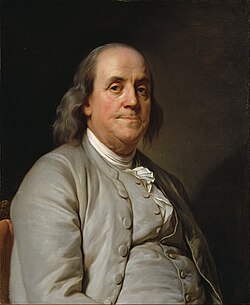Benjamin Franklin Quote
How grossly are they mistaken in imagining slavery to be disallowed by the Alcoran! Are not the two precepts, to quote no more, Masters treat your slaves with kindness: Slaves serve your masters with cheerfulness and fidelity, clear proofs to the contrary? Nor can the plundering of infidels be in that sacred book forbidden, since it is well known from it, that God has given the world and all that it contains to his faithful Mussulmen, who are to enjoy it of right as fast as they can conquer it. Let us then hear no more of this detestable proposition, the manumission of christian slaves, the adoption of which would, by depreciating our lands and houses, and thereby depriving so many good citizens of their properties, create universal discontent, and provoke insurrections, to the endangering of government, and producing general confusion.
How grossly are they mistaken in imagining slavery to be disallowed by the Alcoran! Are not the two precepts, to quote no more, Masters treat your slaves with kindness: Slaves serve your masters with cheerfulness and fidelity, clear proofs to the contrary? Nor can the plundering of infidels be in that sacred book forbidden, since it is well known from it, that God has given the world and all that it contains to his faithful Mussulmen, who are to enjoy it of right as fast as they can conquer it. Let us then hear no more of this detestable proposition, the manumission of christian slaves, the adoption of which would, by depreciating our lands and houses, and thereby depriving so many good citizens of their properties, create universal discontent, and provoke insurrections, to the endangering of government, and producing general confusion.
Related Quotes
We should always be clear that animal exploitation is wrong because it involves speciesism. And speciesism is wrong because, like racism, sexism, homophobia, anti-semitism, classism, and all other for...
So it is always preferable to discuss the matter of veganism in a non-judgemental way. Remember that to most people, eating flesh or dairy and using animal products such as leather, wool, and silk, is...
Ethical veganism results in a profound revolution within the individual; a complete rejection of the paradigm of oppression and violence that she has been taught from childhood to accept as the natura...
Being vegan is easy. Are there social pressures that encourage you to continue to eat, wear, and use animal products? Of course there are. But in a patriarchal, racist, homophobic, and ableist society...
What, to the American slave, is your Fourth of July?I answer: a day that reveals to him, more than all other days in the year, the gross injustice and cruelty to which he is the constant victim. To hi...
About Benjamin Franklin
Born in the Province of Massachusetts Bay, Franklin became a successful newspaper editor and printer in Philadelphia, the leading city in the colonies, publishing The Pennsylvania Gazette at age 23. He became wealthy publishing this and Poor Richard's Almanack, which he wrote under the pseudonym "Richard Saunders". After 1767, he was associated with the Pennsylvania Chronicle, a newspaper known for its revolutionary sentiments and criticisms of the policies of the British Parliament and the Crown. He pioneered and was the first president of the Academy and College of Philadelphia, which opened in 1751 and later became the University of Pennsylvania. He organized and was the first secretary of the American Philosophical Society and was elected its president in 1769. He was appointed deputy postmaster-general for the British colonies in 1753, which enabled him to set up the first national communications network.
Franklin was active in community affairs and colonial and state politics, as well as national and international affairs. He became a hero in America when, as an agent in London for several colonies, he spearheaded the repeal of the unpopular Stamp Act by the British Parliament. An accomplished diplomat, he was widely admired as the first U.S. ambassador to France and was a major figure in the development of positive Franco–American relations. His efforts proved vital in securing French aid for the American Revolution. From 1785 to 1788, he served as President of Pennsylvania. At some points in his life, he owned slaves and ran "for sale" ads for slaves in his newspaper, but by the late 1750s, he began arguing against slavery, became an active abolitionist, and promoted the education and integration of African Americans into U.S. society.
As a scientist, Franklin's studies of electricity made him a major figure in the American Enlightenment and the history of physics. He also charted and named the Gulf Stream current. His numerous important inventions include the lightning rod, bifocals, glass harmonica and the Franklin stove. He founded many civic organizations, including the Library Company, Philadelphia's first fire department, and the University of Pennsylvania.
Franklin earned the title of "The First American" for his early and indefatigable campaigning for colonial unity. He was the only person to sign the Declaration of Independence, Treaty of Paris, peace with Britain and the Constitution. Foundational in defining the American ethos, Franklin has been called "the most accomplished American of his age and the most influential in inventing the type of society America would become".
Franklin's life and legacy of scientific and political achievement, and his status as one of America's most influential Founding Fathers, have seen him honored for more than two centuries after his death on the $100 bill and in the names of warships, many towns and counties, educational institutions and corporations, as well as in numerous cultural references and a portrait in the Oval Office. His more than 30,000 letters and documents have been collected in The Papers of Benjamin Franklin. Anne Robert Jacques Turgot said of him: "Eripuit fulmen cœlo, mox sceptra tyrannis" ("He snatched lightning from the sky and the scepter from tyrants").
